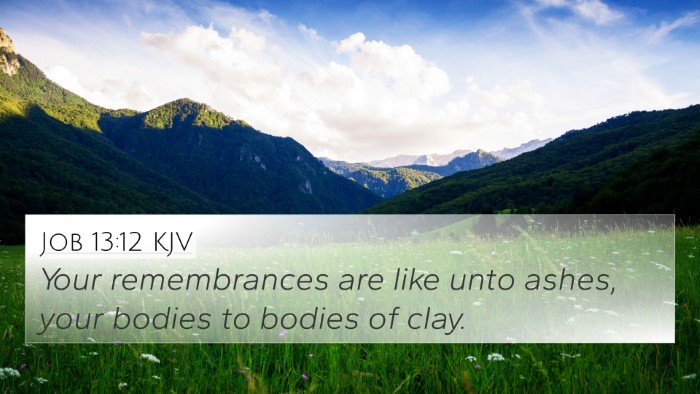Old Testament
Genesis Exodus Leviticus Numbers Deuteronomy Joshua Judges Ruth 1 Samuel 2 Samuel 1 Kings 2 Kings 1 Chronicles 2 Chronicles Ezra Nehemiah Esther Job Psalms Proverbs Ecclesiastes Song of Solomon Isaiah Jeremiah Lamentations Ezekiel Daniel Hosea Joel Amos Obadiah Jonah Micah Nahum Habakkuk Zephaniah Haggai Zechariah MalachiJob 29:1 Similar Verses
Job 29:1 Cross References
Moreover Job continued his parable, and said,
Uncover the Rich Themes and Topics of This Bible Verse
Listed below are the Bible themes associated with Job 29:1. We invite you to explore each theme to gain deeper insights into the Scriptures.
Job 29:1 Cross Reference Verses
This section features a detailed cross-reference designed to enrich your understanding of the Scriptures. Below, you will find carefully selected verses that echo the themes and teachings related to Job 29:1 KJV. Click on any image to explore detailed analyses of related Bible verses and uncover deeper theological insights.

Numbers 23:7 (KJV) »
And he took up his parable, and said, Balak the king of Moab hath brought me from Aram, out of the mountains of the east, saying, Come, curse me Jacob, and come, defy Israel.
Job 29:1 Verse Analysis and Similar Verses
Understanding Job 29:1
Job 29:1 states, "Moreover, Job continued his parable, and said," signaling a transition into a reflective and personal discourse by Job. This verse serves as the gateway into Job's expression of his past glory and the stark contrast to his present suffering.
Context and Background
In the Book of Job, we witness a man grappling with intense suffering and loss. Chapter 29 allows Job to reminisce about his former status as a respected leader among his people, a stark juxtaposition to his current state of despair.
Commentary Insights
Matthew Henry's Commentary
Henry notes that Job's parable encapsulates the memories of his past life, emphasizing the significance of these recollections as a mechanism for Job to process his current affliction. He points to Job’s righteous character and influence in his community, highlighting the mercies he extended to the needy and the integrity he maintained.
Albert Barnes' Notes
Barnes emphasizes the importance of Job's reflections in this verse as necessary for understanding the weight of his lamentation. He details how Job recalls his past, indicating the blessings he once enjoyed and the honorable stature he held, which makes his present suffering all the more poignant.
Adam Clarke's Commentary
Clarke provides a detailed examination of the word "parable," suggesting that Job uses it in the sense of a heartfelt reflection rather than a mere story. He expresses that Job's description serves to remind both himself and his listeners of the stark contrast between his former life and current distress.
Thematic Analysis
This verse touches on themes of memory, dignity, and the impact of suffering on human identity. The way Job recalls his past not only highlights personal loss but also raises understanding of how such memories influence coping and hope.
Cross-References and Connections
- Psalms 34:19: "Many are the afflictions of the righteous, but the Lord delivers him out of them all." This verse speaks to the reality of suffering in the life of believers, echoing Job's own experience.
- Proverbs 15:24: "The path of life leads upward for the prudent, that he may turn away from Sheol beneath." This proverb reflects the concept of a righteous life leading to blessings, akin to Job's past life.
- 2 Corinthians 1:3-4: "Blessed be the God and Father of our Lord Jesus Christ... who comforts us in all our affliction." This New Testament verse parallels Job's desire for comfort in his sorrows.
- Romans 8:28: "And we know that for those who love God all things work together for good." Job's faith in God's ultimate justice can be connected here.
- James 5:11: "Behold, we consider those blessed who remained steadfast." This highlights Job's endurance through trials and suffering.
- Isaiah 61:3: "To grant to those who mourn in Zion... that they may be called oaks of righteousness." This speaks to restoration after grief, similar to Job's hope for restoration.
- Philippians 4:11-12: "I have learned in whatever situation I am to be content." This reflects the soul's journey through adversity, a theme Job grapples with.
Insights Into Job's Character
Job's character is pivotal in understanding the Book of Job. His reminiscence in this verse illustrates his righteousness, integrity, and his act of service to others, encompassing both social and spiritual dimensions.
Application for Readers
For modern readers, Job 29:1 reminds us to reflect on our past, appreciate the blessings we've received, and understand the depth of our struggles. Job's transition into sorrow serves as a lesson in the human experience of suffering and redemption.
Final Thoughts
Job's narrative invites us to explore the connections between our experiences and the text, permitting a deeper understanding of suffering and fidelity in faith. As we reflect on Job 29:1, we can utilize tools for Bible cross-referencing to delve deeper into these themes and find solace in scripture.
Further Exploration
For those studying this verse closely, consider these methods of Bible cross-referencing:
- Utilizing a Bible concordance to discover related verses.
- Engaging in cross-reference Bible study to enhance thematic understanding.
- Applying Bible reference resources to uncover additional layers of meaning.




